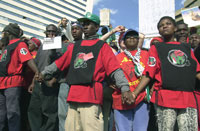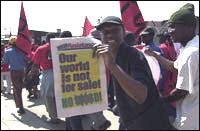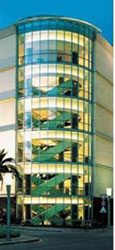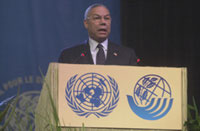Liza Grandia is a doctoral candidate in anthropology at the University of California at Berkeley. She serves on the board of ProPeten, a Guatemalan nongovernmental organization with which she founded Remedios, an integrated health, population, and environment program, in 1997. She is a fellow of the Environmental Leadership Program.

Tuesday, 3 Sep 2002
JOHANNESBURG, South Africa
My second morning at the United Nations World Summit on Sustainable Development, I read in the Johannesburg newspaper, The Star, that, “South Africa’s security establishment is bracing itself for its biggest challenge as it seeks to prevent legal demonstrations at the world summit from being infiltrated by anarchists, anti-globalization hardliners, land rights activists, and even Zimbabwean war veterans.” A Danish activist and I chuckled at this odd juxtaposition of social categories, especially since we reckoned that we’d fit under a couple of them ourselves.

Protesters make a human chain.
Photo: IISD.
A week later, I found myself in the middle of Alexandra, one of Johannesburg’s poorest townships, marching with about 15,000 people from the African Landless People’s Movement, the Anti-Privatization Forum, and other groups around the world opposed to corporate globalization. It was one of two legal marches held that day to protest the exclusion of grassroots organizations and civil society in general from the official U.N. government forum.
I came to the WSSD as an anthropologist, to observe the rituals of global summitry and to learn about efforts around the world to implement Agenda 21, the document crafted 10 years ago at the U.N. Conference on Environment and Development in Rio de Janeiro. I have been disappointed to find that the same civil society organizations which had been celebrated during UNCED as the hope of the future are being systematically excluded from the WSSD through both direct means (only a tiny fraction of us are allowed into the official plenary halls for “security reasons”) and indirect means (the civil society forum is strategically located at the other end of town). To make matters worse, the U.S. delegation seems determined to hijack the conference by relentlessly pushing a self-interested “free” trade agenda. For these and other reasons, I felt compelled to take to the streets with a group of U.S. citizens unhappy with our government’s bully tactics at the conference.
As we waited early Saturday morning on a street corner near the Sandton convention center for vans to drive us to Alexandra, one veteran protester nonchalantly inquired if anyone had brought rags and bottles of water in case we got tear gassed. I began to get worried. My adrenaline really began to pump as we drove into the township past dozens of tanks and police in full riot gear. My friends and I double-checked our contact lists, discussed escape plans, and laughed nervously that we ought to spare our mothers these details once we got home.
By 9 a.m. a sizeable crowd had gathered at a high school in the Alexandra east bank. Small groups began to sing and dance while the police systematically filmed us from atop their tanks (so as to identify us later through facial recognition technology, I suppose, adding a few more pages to all our files!). The demonstration was primarily composed of South African groups under the umbrella of the Social Movements Indaba, but marching in solidarity with them were many hundreds of WSSD delegates from all around the world — the Philippines, Korea, Indonesia, Palestine, Nigeria, and Mexico, to name a few of the places of origin of people I met that day. As we waited to begin, I prayed that there were not any provocateurs planted among us.
The mood was jubilant and peaceful as we slowly began our march to the Sandton convention center. The oldest marchers boarded buses to ride behind the march — but in terms of energy expenditure, they could just as well have been walking with us, given the way the buses literally swayed up and down to the rhythm of dancing and freedom songs inside. Residents of Alexandra lined the entire route to wish us well and join in song. The crowd swelled as we wove our way through streets lined with open sewage ditches. Police and tanks also lined the streets, along with the occasional ambulance (leading me to worry that the police were expecting people to get hurt). The newspapers reported the next day that 8,000 police had been on duty — practically one for every two protestors.

Newspapers were used as placards during this march.
Photo: IISD.
The banners of my compatriots said things like, “WTO out of WSSD,” “Wild Summit on Sustainable Destruction,” “Argentina: Neoliberal Success Story … Next Customer Please,” “Our World is Not for Sale,” and my favorite sign from a South African marcher, “The Privatization Man is a Very Bad Man.” Interested marchers stopped me every few yards to read the placard I made for myself, which read, “The U.S. government spends 46 cents on every $1 of our taxes on the military. Fund Agenda 21, not more war!” (see www.warresisters.org for more information). I was struck by their grateful surprise that U.S. citizens were willing to march with them to criticize our superpower government. And I delighted in the “small world” connections that emerged from conversations along the route. I even met a young Nigerian man who knows one of my dissertation committee members!
As the miles went by, it became clear that the march was going to remain peaceful: the police visibly relaxed behind their riot gear. Although initially overwhelmed by the surrounding poverty in the township, I began to observe signs of a vibrant informal economy evidenced by dozens of small businesses run out of people’s homes. Any money that entered this township was recirculated many times over — in complete contrast to my own suburban neighborhood in the U.S., where our consumer dollars immediately escape from the community into the bank accounts of corporate chain store executives.
When we finally arrived at Sandton, the contrast between the luxurious convention center and the extreme poverty of Alexandra seemed a microcosm of the global disparities of wealth that the WSSD is supposed to address. The tired crowd filed into a huge square to hear rousing speeches while helicopters continued to circle menacingly overhead. I’m grateful and proud that the march remained nonviolent to the end. Yet, I feel sad, indeed appalled, that we live in a system in which poor women, men, and children are met by police intimidation tactics whenever they march on the streets for the chance to be heard by world leaders, while the real planetary criminals — the corporations — are welcomed through the front door of the United Nations as “partners” in sustainable development.
Wednesday, 4 Sep 2002
JOHANNESBURG, South Africa
Every morning as I walk into the WSSD convention area at Sandton, my bile rises when I see the BMW display in what ought to be a public square. Were it not for these enormous, high-tech tents and cars on display, this courtyard would have been an excellent informal meeting area, and who knows what wonderful encounters, friendships, and alliances might have developed in that space.

Sandton Convention Centre: looks so shiny.
Photo: IIDS.
BMW is not, of course, the only corporation here with a fancy, multi-million dollar exhibit. While I resent this appropriation by big business of scarce physical space at the WSSD, the corporate takeover of the conference has been far more insidious on the ideological front. Ten years ago at Rio, there was a revolutionary focus on the critical importance of NGOs and grassroots movements as partners in sustainable development. By contrast, in Johannesburg, economics and trade have dominated the discussion. According to the official propaganda, sustainable development will somehow trickle down to developing countries as soon as they agree to open their markets to foreign trade and investments. And if that doesn’t work, then Type II initiatives will save the day.
When I first arrived, everyone was talking about these “Type II outcomes” and I wondered what in the world they were. The U.S. delegation in particular seemed wildly excited about them. I noted, as well, that several days had been set aside in the agenda for plenaries about them. Being a good anthropologist, I decided to inquire with a native member of the tribe of summit nomads (aka conference jetsetters) about the meaning of this phrase and learned that it is U.N.-ese for “partnerships.” Partnerships. On the surface, they sound warm and fuzzy enough. Who could argue against fostering collaborations for sustainable development among the private sector, government, and civil society? Yet, over the past 10 days, I’ve grown increasingly suspicious about the cheery rhetoric on partnerships here at the WSSD.
First, this emphasis on partnerships seems entirely inappropriate for a multilateral summit. Our governments are supposed to be negotiating internationally binding agreements and not just crossing their fingers and hoping that some voluntary partnerships will save the planet. There are no formal mechanisms of accountability for these partnerships — and so of course multinational corporations love the idea. In essence, the plan for partnerships mirrors big business’s preference for encouraging “best practices” rather than creating new regulatory frameworks.
Over and over, I’ve heard here at the WSSD that for these partnerships to be successful, developing countries must create environments of “good governance” with a strong “rule of law.” Again, big business loves this idea, since it would serve to create a healthy climate for foreign investment. It’s telling, though, that the rhetoric here is about “good governance” and not about “democracy.” When they talk about “good governance,” business isn’t really concerned about human rights; they just want help from governments to control the unruly elements of their society (such as anti-globalization activists).
What’s more, most of the 218 official partnerships announced here with great fanfare already existed or were in the planning stages. In other words, they aren’t new initiatives — but they have certainly provided a good distraction from the failure of the conference to reach any new agreements. Many delegates, in fact, are joking that the WSSD should be called Rio minus 10, not Rio +10.
Finally, I am skeptical of all the partnership propaganda because it fails to address the disparities of power between the private sector and civil society and, increasingly, between the private sector and government. A couple of alarming statistics I’ve learned here at the WSSD illustrate this. Of the 100 largest economies in the world, 51 are corporations and 49 are governments. (Wal-Mart is bigger than Norway.) Yet, while the Fortune 500 corporations represent 47 percent of the planet’s collective GNP, they only employ 1.6 percent of the world’s population. Given corporations’ overwhelmingly skewed economic power, NGO or government partnerships with them are likely to be more coercive than collaborative. Northern and mainstream NGOs are particularly vulnerable, I think, to being co-opted and having their agendas diluted by corporate partnerships — about which I’ll comment more tomorrow in my closing reflections on the disastrous divide I’ve witnessed at the WSSD between rich and poor NGOs.
Meanwhile, we have much work to do as civil society organizations and movements to reclaim our rightful role as the real partners in sustainable development.
Thursday, 5 Sep 2002
JOHANNESBURG, South Africa
Yesterday morning, U.S. Secretary of State Colin Powell waltzed into the Sandton convention center almost an hour late for his designated five minutes at the plenary podium. Powell’s tardiness was fittingly symbolic, I thought, of the disrespect that the U.S. had shown throughout the WSSD for the other nations of the world — for example, constantly stalling negotiations until they heard back from Dubya (and/or Vice President Dick Cheney, who is the one we all suspect is really in charge). In fact, as late as 4:00 p.m. on the last day of the summit, I saw U.N. head Kofi Annan having to make a humiliating explanation to the press that things were behind schedule with the final action plan because the U.S. had not yet approved certain parts of the document. To say the least, there was a lot of pent up rage and disgust at the U.S. government’s behavior throughout the conference by the time Powell arrived to speak.

Colin Powell speaks to an angry crowd.
Photo: IIDS.
When Powell approached the podium, I noted an eerie silence in the convention hall. He received absolutely no introductory applause. I vaguely knew that some U.S. NGOs had made plans to unfurl banners from the stadium seats that had been given to civil society delegates at the back of the hall. Little did I know that official delegates and others would spontaneously join the chanting and booing that the U.S. NGOs began — which lasted throughout Powell’s entire speech. I, myself, had not anticipated how angry I would feel — particularly after Powell dared to tout some hypocritical propaganda about U.S. support for the summit’s water and sanitation goals, when it was well known that the U.S. had been holding out all week on these particular health agreements as bargaining chips against the poorer nations in the more controversial negotiations on corporate accountability, climate change, and energy. To bargain with the lives of millions of children who will die of diarrhea because of inadequate water and sanitation is, to me, beyond reprehensible. (Gro Brundtland, the director-general of the World Health Organization, reported at the WSSD that one-third of the 13,000 children who die every day succumb to preventable environmental causes — the equivalent of a jumbo jet filled with children crashing every 45 minutes).
Powell was visibly shaken by the negative response to his presence; many of us walked out during his speech as a final statement of dissent. From outside the convention hall, I could hear that he barely received a few seconds of less-than-polite applause. The media swarmed around those of us who had walked out or been removed by security guards. Throughout the day, people from other countries expressed their appreciation and congratulated us for having stood up to our government.
All in all, it was a terrifically successful action. Or was it? I found myself pondering the question on the T-shirt a good friend helped me procure here that read: “What are we going to do about the U.S.?” This question was apparently asked by a high-level summit leader at the final preparatory meeting for the WSSD (held earlier this year in Bali, Indonesia) who did not realize his microphone was on. It remains a good question. What are we going to do as U.S. citizens about our government’s tendency to act as a rogue superpower?
Unfortunately, our actions at the WSSD as U.S. citizens and NGOs were too little, too late. We were shamefully unprepared and disorganized compared with NGO delegations from other countries. On Sunday, by sheer luck, I heard about a meeting between U.S. NGOs and four congressional representatives who were honorary members of the official delegation. The meeting turned out to be an extraordinarily substantive dialogue led by Rep. Christopher Shays (R-Conn.) — the best civic moment I’ve personally witnessed, ever. What was alarming, however, was that the four congressional members said they had no power in the official U.S. delegation; all decisions were apparently coming straight down through the State Department. Yet, had the U.S. government published their list of delegates (in a historically unprecedented move, the U.S. managed to keep its full delegate list secret from NGOs until the last few days of the conference), and had we been more prepared in briefing them ahead of time on our priorities, these congressional representatives could have been much greater allies for us. They appeared to enjoy the Sunday meeting as much as we all did. In the headiness of the moment, someone suggested that they organize a congressional hearing about the WSSD when we all got back. We must make them keep their promise to act upon this splendid idea; please write Shays and encourage him to follow up.
Beyond pressing for this congressional hearing and being more prepared the next time around, I think there are other lessons to be learned by U.S. NGOs from this WSSD experience. First, we should always remember how excluded we felt from the official decision-making process — and should take care not to do the same in our own community work. It’s ironic that communities often make the same complaints about NGOs that NGOs make about the U.N. “Community participation” does not mean asking people’s opinions once decisions are already made, but rather letting those affected by decisions lead their own decision-making process.
Beyond deepening our commitment to community participation, I hope that U.S. NGOs will also take seriously the challenge of strengthening our ties and alliances across international boundaries. Unfortunately, at the WSSD we essentially divided and conquered ourselves. The civil society forum at NASREC was located an hour south of the official summit at the Sandton convention center. I don’t know how and why this decision was made; perhaps there were no other sites to hold all of us. Yet, to make matters worse, many other NGOs chose to organize separate forums all over town — at two different universities, at the Waterdome, at the IUCN Environment Center, and so forth. This presented serious logistical constraints for civil society participants who wanted to create or participate in forums as well as lobby at the government meetings.
The end result was that the wealthier, mostly northern NGOs involved in lobbying did not participate in the civil society forum at NASREC. Their absence was duly noted in plenaries held by the mostly southern NGOs at NASREC. Indeed, throughout these past two weeks, I was often embarrassed to be the only U.S. citizen riding the bus to many of the civil society forums at NASREC (whose building facilities were rather humble and where most of the participants ate cheap hamburgers and snack foods), and then to return to the luxurious Sandton convention center and see all the “inside” NGO representatives with their cell phones and Internet access, holding meetings over fancy dinner.
When I first learned that the environmental NGOs (the World Wildlife Fund, Conservation International, the Nature Conservancy, and the like) had set up a forum near the Sandton convention center, I asked an employee of one of these organizations why they had separated themselves from the civil society forum at NASREC. He replied that he had already spent an afternoon at NASREC and felt that the forum wasn’t really addressing environmental issues anyhow. That, to me, seemed a bit like blaming the victim. But I think there are larger structural factors that may be creating an unfortunate schism between the northern environmental NGOs and the rest of international civil society. At Rio, all NGOs were on the outside, and so these international alliances were easier to maintain. As a result of the spectacular NGO lobbying at Rio, the U.N. opened its doors a little, and a few organizations have gotten inside access. That’s good. But it remains important for those inside to work to open the door still further.
I know from experience that these North/South, rich/poor NGO divisions are not inevitable, because I had the privilege of being involved with the youth caucus organizing for the Fourth World Conference on Women in Beijing in 1995. Although we were at least 30,000 women strong, the NGO forum in Beijing was far better organized and more consolidated than its counterpart here in Johannesburg — even though the WSSD attendance (around 20,000) was more manageable. In Beijing, all the NGO participants decided to be in the same place, and so even though we were placed 40 kilometers away from the government forum, transportation back and forth was smoother. Moreover, the women’s NGO forum was radically participatory, beginning with meetings at the village, district, country, and regional level on every continent. Young women were included in virtually every event I attended at the women’s conference; not a single youth was included in any of the WSSD events I attended here in Johannesburg. From those and other experiences in Beijing, I know that we can do better as a community of NGOs.
To close, I’d like to share a quote by Nelson Mandela that I saw this morning at the entrance of the new Apartheid Museum: “To be free is not merely to cast off one’s chains, but to live in a way that respects and enhances the freedom of others.”
My fellow U.S. citizens, we have much work to do to make our government leaders accountable to the freedom of other nations.


